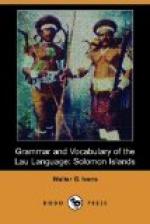The genitives have been dealt with under nouns: i is in most general use, both are used to express purpose, and ni also denotes for, belonging to: fasia muka manata ni bae uri think not to say thus, gera mou ni oli they feared to return, ka ote nia ni rosuli he is tired of obeying.
2. Compound prepositions.
Some of these are nouns used with the locative; the pronoun is suffixed as the actual object or as the anticipatory object when a noun follows: i fafo above, i fara beneath, i lao within. The locative need not be used with lao: lao rodo in the night, lao tala in the path, lao salo in the sky. Some are constructed from verbal nouns to which the suffixed pronoun is always added: fonosia in front of him, nia initoo fonosi gera he ruled over them, fonosi taa to meet what? for what purpose? Certain verbs are used as prepositions: maasi to await, garangi to be near.
CONJUNCTIONS.
Copulative, ma.
Adversative, ta, ma ta
Connective, ta.
Disjunctive, langi, langi fa, ma
langi, ma ka langi.
Conditional, ana, ma ana, saea.
Illative, fi fe.
A mark of quotation is saea, uri. Neither, nor, is expressed by a negative followed by ma. Until is dao ana, lea dao ana.
NUMERALS.
The numerical system is decimal. All numbers over the tens are expressed in tens.
1. Cardinals.
1. eta, ta, te. 2. e rua, ro. 3. e olu. 4. e fai. 5. e lima. 6. e ono. 7. e qalu. 8. e fiu. 9. e siqa. 10. e tangafulu, aqala.
In numbers other than eta the initial e is omitted in quick counting. In composition one is ta, two is ro, te generally means only: rua is reduplicated into ruarua, tau ruarua equidistant.
The prefix too forms distributives: too ro doo two things at a time. Nima is used as well as lima for five. Though qalu eight, appears in the translations as used of an indefinite number it is doubtful whether such use is correct. Tangafulu is the tenth of a series; aqala is used for ten denoting a unit, aqala fono a full ten.
To express units above ten mana is employed: aqala mana fai fourteen.
One hundred is tangalau: tangale doo one hundred things. The sum above the hundred is expressed by mana: tangalau fai aqala mana fai one hundred and forty-four. One thousand is too.
2. Ordinals.




